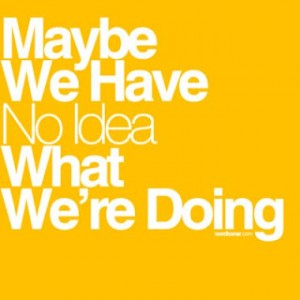
Graphic from his original post. Source: wrdbnr.com
Regular readers may recall SPM member Zack Berger MD PhD’s July post here The pledge of the patient-centered physician. Zack is one of the many SPM members attending the Stanford Medicine X conference this weekend and sends this Saturday night report, cross-posted from his book’s blog.
We’ve often written here about shared decision making, which helps patients choose based on the best available evidence. Here, Zack touches on an alarming but real aspect: what if the evidence is not so good? What have we accomplished? Can we (all) tolerate uncertainty?
_____________
I’m at the Stanford Medicine X conference, which provides much food for thought. Here’s tonight’s musings, based on an assumption which is quite prevalent among patient-centered health care folk today (a group I consider myself a member of). The assumption? More data is better.
That’s a red herring. We all know that only the right data, data linked to better health, is actually useful.
How do we get good data into the hands of patients to – among other things – aid their decision making? Decision aids have been much publicized, and for good reason. They are the next step, taking us from the evidence we already know about to the shared decision making we are trying to achieve.
But decision aids are missing something, I think. Take this Mayo statin decision aid, comparing risks and benefits of cholesterol medications for prevention of heart disease.It’s great. I use it all the time. But I’ve been thinking about something.
It assumes that the benefits can be precisely derived from the literature. Yet we know from a recent Annals of Internal Medicine review by Vinay Prasad that the benefits of statins are themselves in dispute.
So we have a risk/benefit balance added to uncertainty. If we are serious about engaging patients, shouldn’t we try and represent that in our decision aids? We can trust them – if providers are ready to do the work.






In an interview with a CEO of a new ACO, I was told that the delivery of healthcare in the future will be 95% data driven and 5% art/physican skill. That is scary. We are moving down a road of treating to the test not the patient – much the same way teachers now teach to the test, not for mastery in our education system.
There is a lot of lip service about patient engagement but the business of medicine militates against it in a very big way.
This is an excellent point. It is not uncommon for “x” to be promoted as the best treatment (or cure!) and additional research provides new (sometimes contradictory) information. In the meantime the patient who decides to not comply with the original treatment prescription is labeled “non compliant.” Same situation if patients start a medication or treatment and stop due to side effects.
I think the recent studies on blood pressure and age are a good example. Elderly patients have “secretly” been not taking BP meds for a long time because they get light headed and don’t want to fall.
So I agree that decision aids should incorporate side effects and the decision not to “comply” with the doctors advice. The latter should be a valid and respected decision.
I think this will also improve the doctor/patient relationship as patients will often nod and agree and then proceed to do what they want. Not expecting their point of view to be considered or respected.
Perhaps the key is a level of comfort with ambiguity?
This is one of the most difficult things for me to communicate with some patients about,,,,just how uncertain so much of medicine is. A test result or recommendation from a tool feels solid and trustworthy. Intuition and wisdom gained from a long term relationship with a trusted physician is a valuable part of health for many (and could be for many more). This is “softer” and seems to be either just known or, if not, hard to grasp.
You have hit on one of the main challenges of making decision aids. It’s extremely difficult to often get reliable and similar evidence especially when comparing a number of treatment options and not just a binary decision about using or not using a medication. And even when good data exists, it’s extremely difficult to get the clinicians to agree on what it means and how we should talk about it.
Zack,
Many years ago, I was prescribed Statins based on a then belief of Cholesterol levels and control. I was working then and carrying heavy loads of coins for Slot machines, to and fro cashier to machine. My shins were aching, my eyes tearing. I worked in pain, every step.
I joined a Statin Research Study, and the lead researcher a well studied, high integrity physician told me to never allow Statins to be prescribed for me. My age and gender did not show adequate reason and my side effects were strong. Over the years,I resisted my primary many times. As time passed, cholesterol attitudes changed and my primary no longer pushed for statins.
I just saw a cardiologist who knows the researcher well and disagrees with her. I will have a second opinion overall and the original cardiologist feels the second one will want me back on Statins. I do not blindly follow advice, so unless there is a marked change in side effects, I will question this.
Compartmentalizing patients within specialties is not fair to the entire patient. I am an active Patient and Family Centered Care advocate. Stanford is actively pursuing being such a facility. There will be a shift, the sooner the better.
We must remember that clinical trials and their data sets are used to create a common language in medical research.Data provides information,but doesn’t grant wisdom to the user. With judgement and experience, improved care can result. This is the goal of the business world, but it does not derive directly from formulas.
This common language evolves daily,requiring more wisdom than number-crunching. Many physicians fail to understand the limitations of the studies. Others are often unable to use the information from studies accurately for their patients.
It requires humility to accept how little we know, and how best to apply what knowledge. Patients are fiercely aware of the uncertainty and limitations in the medical world, and are rightly skeptical of both. Physicians who acknowledge their own skepticism give shared decision life and meaning.
Terrific comments, everyone! I’ve been offline all day – apologies to those whose comments were delayed.
I love that this resonates both with sharp patients and sharp clinicians. And for those who don’t know, Geri is from Emmi Solutions, which makes decision aids too.
xanderyn@gmail.com
Re: pros and cons of statins: John Abramson, M.D. wrote a book I picked up in 1984, quite a while ago. Discover magazine mentioned something about his book, Overdosed America, and what he had to say about statins and many other things.
My copy is in storage with a moving company, but it would be worth looking at again.
He also wrote about drug trials, sometimes financed by the pharmaceutical companies that manufacture the drugs. Sometimes when people in the trials show up with adverse affects, out they go, and those affects never get reported. If I remember correctly, all these years later, there were definitely questions about statins.
In 2005 my doctor in another city and state called me on the phone and said something about putting me on “cholesterol medication”. At the time, my hdl was 92 and ldl 97. Not bad. So I said fine. I’ll come to your office, we’ll look at the lab slip together and then please repeat what you just told me.
That was in a different decade, and there was talk about too many prescriptions for statins being written. What you are saying about benefits versus risks is still true.
And around that same time period, 5 different men I knew in their 40’s and 50’s all suddenly were taking statins and high blood pressure meds. And when I asked each one individually if their doctor had recommended a change of lifestyle, across the board, the answer was no. Why?